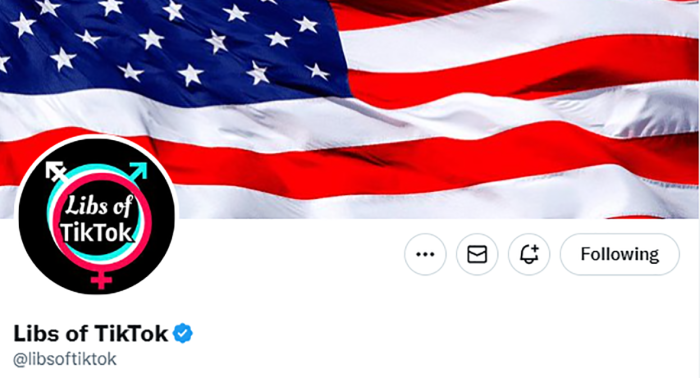Libs of TikTok responds to new 'Twitter Files' release showing account was blacklisted

Former New York Times columnist Bari Weiss released the latest trove of documentation from the “Twitter Files” showing that Libs of TikTok was among several accounts that the social media giant blacklisted before Elon Must took over.
In a Thursday night Twitter thread, Weiss posted the names of accounts that Twitter flagged, preventing their tweets from trending and reducing their visibility. Dr. Jay Bhattacharya, a health policy professor from Stanford University who opposed COVID-19 lockdowns, and conservative commentators Dan Bongino and Charlie Kirk were among those on the list, along with Libs of TikTok.
Weiss said the Libs of TikTok account was on a “Trends Blacklist” and was designated as “Do Not Take Action on User Without Consulting With SIP-PES.”
“This secret group included Head of Legal, Policy, and Trust (Vijaya Gadde), the Global Head of Trust & Safety (Yoel Roth), subsequent CEOs Jack Dorsey and Parag Agrawal, and others,” Weiss said.
“The [Libs of TikTok] account — which Chaya Raichik began in November 2020 and now boasts over 1.4 million followers — was subjected to six suspensions in 2022 alone, Raichik says. Each time, Raichik was blocked from posting for as long as a week,” the former NYT columnist tweeted.
Twitter reportedly informed Raichik that it had suspended her for violating the platform’s rules against posting “hateful conduct.” The committee responsible for the decision claimed that Raichik’s posts encouraged online harassment of “hospitals and medical providers” by exposing hospitals that are prescribing puberty blockers to children and performing body-mutilating sex change surgeries on youth. They claimed that such experimental procedures are "gender-affirming healthcare" and not “equivalent to child abuse or grooming.”
Weiss also posted what appears to be screenshots of internal messages from Yoel Roth, Twitter’s former head of safety and integrity, asking for research on “non-removal policy interventions like disabling engagements and deamplification/visibility filtering.”
The former columnist shared what she says is an internal SIP-PES memo from October 2022, after Raichik’s seventh suspension from Twitter. According to Weiss, the committee acknowledged that “LTT has not directly engaged in behavior violative of the Hateful Conduct policy."
During an interview with Tucker Carlson Thursday night, the Libs of TikTok creator said she had felt as if her tweets were receiving less engagement than usual despite having a large number of followers.
“The craziest part of this whole thing is that they admitted I’m not even violating policy, and they still suspended me seven times,” Raichik told Carlson. “Three of which were for a week at a time.”
“So I was suspended for probably a month altogether, and for what? For not even violating their policy.”
On Thursday, Libs of TikTok tweeted several times about former Twitter CEO Jack Dorsey’s claims that the platform did not “shadowban according to political ideology or viewpoint.”
In a separate tweet, Raichik put out, she reposted a July 2018 tweet from Dorsey, where the CEO asserted that the platform does not “shadow ban” based on accounts’ political viewpoints.
“We do rank tweets by default to make Twitter more immediately relevant (which can be flipped off,” Dorsey wrote, linking to a page that provided a breakdown of the site’s ranking signals.
The Twitter thread that Weiss released is the second report related to what Twitter’s new CEO has named the “Twitter files.”
As The Christian Post previously reported, Musk promised last month that he would follow through with his pledge to make Twitter more transparent by releasing what he dubbed the “Twitter Files on free speech suppression,” adding, “The public deserves to know what really happened ... ”
The comments were apparently tied to a conference hosted by the Knight Foundation that featured Roth as a speaker. The former Twitter employee explained his reason for resigning from the company despite Musk promising to implement reforms as its new head.
Roth said in October 2020, days before Americans were to vote in the presidential election, the social media website blocked users’ ability to share links to a New York Post story about Hunter Biden’s laptop.
The New York Times would later confirm the laptop’s existence in a report about an ongoing federal investigation into Hunter Biden’s tax filings.
Twitter prevented accounts that had a large following from sharing the laptop story, according to reports. In October 2020, the Senate Judiciary Committee subpoenaed Dorsey, who testified that it had been “wrong” to stop the story from being shared.
Samantha Kamman is a reporter for The Christian Post. She can be reached at: [email protected].




























